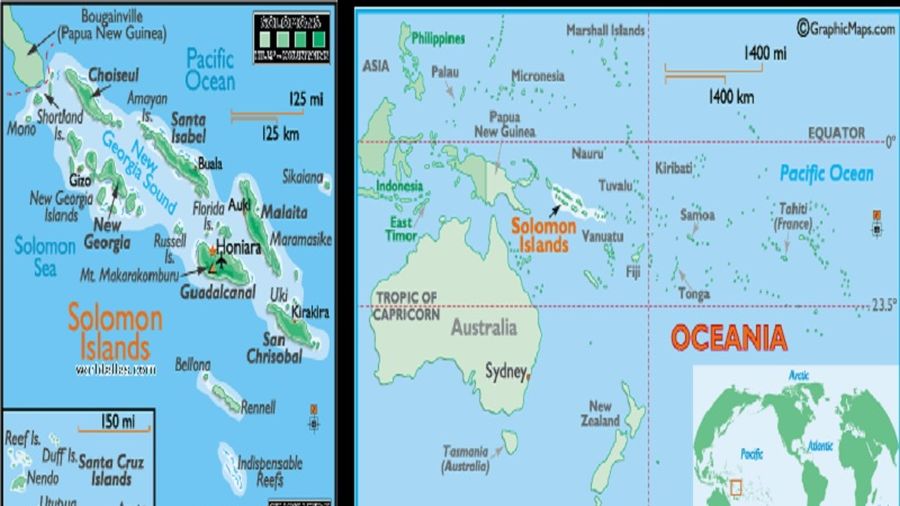Why Is Australia Artificially Replicating the Ukrainian Scenario in the South Pacific?
Hyping up China’s soft security pact with the Solomon Islands preconditions the domestic public to expect an Australian-led AUKUS invasion of that country or any others in the South Pacific that consider similar such deals with the People’s Republic.
Australia, which is a member of the anti-Chinese AUKUS military alliance alongside the UK and US, is attempting to replicate the Ukrainian scenario in the South Pacific by fearmongering about the soft security deal between China and the Solomon Islands. Prime Minister Morrison warned that any Chinese military base there would be a so-called “red line”, which Defense Minister Dutton ominously followed up on by declaring that “The only way you can preserve peace is to prepare for war.”
On the surface, regional developments seem to mirror the Russia-NATO security dilemma in Ukraine. That’s a false comparison though as the author explained in his latest analysis for CGTN titled “Solomon Islands & Ukraine: Similar Or Different Security Situations?” The artificially manufactured replication of that scenario in the South Pacific is extremely destabilizing and is being pursued for purely self-interested reasons that will inevitably occur at the expense of the region’s impoverished inhabitants.
The author warned in September 2020 that “The Quad Is Plotting A Proxy War With China In The Solomon Islands”, though the title can now more accurately be amended by replacing the Quad with AUKUS. Everything came to a head last December following the anti-Chinese riots that engulfed that tiny nation’s capital and inspired the author to conclude that “The Solomon Islands’ Unrest Is Part Of The Hybrid War On China”. Both should be reviewed by the reader to learn about the strategic context.
In brief, AUKUS has an interest in fearmongering about China’s growing economic and other forms of influence in the region that Australia has historically regarded as its so-called “backyard”. The purpose in doing so is to galvanize this new anti-Chinese military alliance and potentially even plot a multilateral invasion of that nearby country in order to improve interoperability between its members. Hyping up China’s soft security pact with the Solomon Islands preconditions the domestic public to expect this.
In other words, it’s nothing more than information warfare waged against the AUKUS states’ own people and the rest of the international community more broadly. It’s meant to have them expect the alliance to “intervene” (as they’d likely phrase it) to “uphold regional security” in the face of “China’s destabilizing threat”. The real trigger of instability, however, is Australia playing the leading role in this Hybrid War in order to prove its worth to the UK and US as their top anti-Chinese partner.
There is absolutely no objective reason for Australia to “prepare for war” over China’s soft security pact with the Solomon Islands, which Beijing once again officially denied includes any plans for establishing military bases there. All that this rhetoric does is destabilize the region by putting everyone on a war footing over a completely false pretext. Even in the extremely unlikely event that China was to set up air and/or naval bases there, it wouldn’t pose any realistic threat to Australia.
That’s because there’s no way that America’s regional military forces in the Western Pacific (which includes both the Northern Pacific near China’s borders and the South Pacific within which the Solomon Islands is located) would stand by and let the People’s Republic attack Australia just for the sake of it and with impunity at that. No serious observer expects that scenario, nor would the Chinese themselves, hence why it wouldn’t ever happen. Australia is literally inventing a false security threat.
The secondary purpose served by doing so apart from galvanizing AUKUS in preparation of a possible invasion of the Solomon Islands is to pressure nearby South Pacific states to not consider any similar such deals with China. The Damocles’ sword that now hangs over their heads is that Australia will wage a Hybrid War against them if there’s any suspicion that they’re seriously discussing such deals, which could culminate in an Australian-led AUKUS “preemptive” invasion to “thwart the threat”.
Viewed from the prism of International Relations theory, Australia is aspiring to proudly become the regional hegemon with its AUKUS allies’ full support, all on the pretext of countering some imaginary so-called “Chinese threat”. The false logic is that economic deals are a precursor to soft security ones, so it therefore supposedly follows that those South Pacific states that already have such with China or are considering them need to be pressured as soon as possible to “avert an inevitable military threat”.
It’s this, and not China’s Belt & Road Initiative (BRI) or soft security deals, that pose the greatest regional threat. The impoverished people of the South Pacific are still citizens of UN-recognized independent states that have the sovereign right to choose their developmental and security partners. For as much as Australia nowadays talks about the so-called “rules-based order”, it’s blatantly violating its most fundamental principles by hegemonically pressuring those smaller countries around its periphery.
Considering how far everything has already gotten in the Solomon Islands case study, it’s unrealistic to expect Australia to change course and reconsider its regional grand strategy. Its leadership has made up their minds, likely under joint UK-US influence, to play this role in the South Pacific as part of AUKUS’ larger anti-Chinese ambitions in Asia. For these reasons, the region should brace itself for major instability in the coming future if Canberra decides to flex its muscles by attacking a nearby country.







